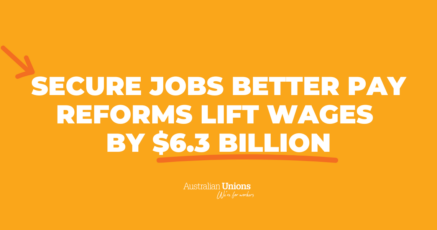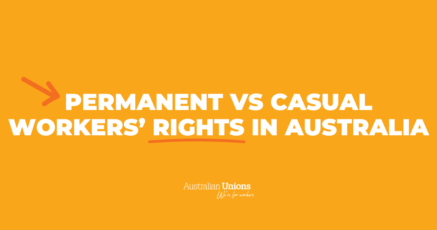If you or someone you know is thinking about going to university, here’s something you should know.
Universities are not run for the benefit of students. And guess what? They haven’t for years.
Students are paying more in fees while being offered less choice in courses, pushed into massively sized classes and treated by university management like products on an assembly line.
The university was intended as a community of students and academics, promoting free thinking and equality. But what we see now is our institutions transforming into businesses more interested in profiting from students rather than providing an environment for important learning and research.
Workers are caught in the thick of this business-centric approach, leaving them with little choice but to constantly chip in unpaid hours to provide students the education they seek, all the while jumping from contract to contract.
Creative writing lecturer and NTEU member Toby Fitch likens working as a casual academic to being a “mercenary” in his poetry collection Sydney Spleen.
“how I’m not currently ‘employed’ by the University / though I was last semester a mercenary / a ‘casual’ ‘teaching-focused’ shock-absorber,” the poem says.
Fitch has experienced first-hand, along with many other university workers, the wide gap between the profits of our lauded institutions and how they treat their staff. And he knows well that students pay the price too.
Staff working conditions are student learning conditions
It hasn’t always been this way. Over the past four decades, Vice Chancellors and executives have transformed universities from non-profit public institutions to profit-focused businesses.
As a result, university management has raked in huge profits from students – especially international students who must pay fees upfront and at higher rates. Yet it’s hard to see how those profits have benefitted students or been shared fairly with university workers.
Students now face the cost of their degrees that has never been higher, and yet the unit cost going to staff has never been lower.
National Tertiary Education Union (NTEU) President Alison Barnes said the money is instead lining the pockets of executives.
“Those renumeration packages for Vice Chancellors: they’re a million dollars. You’re paying yourself a million dollars whilst stealing the wages of your employees.”
Students have noticed. They see the unpaid hours that casual employees put into making sure students receive the feedback and support they need.
Student Lia Perkins described the lengths to which teachers would go to be there for students.
“I’ve had a tutor who did a tutorial from his hospital bed because he wasn’t going to be paid otherwise. That is really going above and beyond in unpaid work to give us the education we deserve.”
Meanwhile, only one in three workers at Australian universities have ongoing, secure work.
“Tutorial sizes have exploded in some cases to more than 90 students, forcing lone casual tutors to become lecturers, coordinators and website managers while only being paid the minimum tutorial rates,” Fitch said during a strike at the University of Sydney this year.
Barnes explained that casualisation isn’t just a problem for teaching and research staff.
“It’s also professional staff. So people who provide the pastoral care for students, people who make sure the IT is working. It’s across all facets of university life.”
“It’s damaging the integrity and fabric of universities,” she said.
Whether it be requiring academics to teach with doubled class sizes or slashing administration jobs so even the library becomes inaccessible, it is clear that staff working conditions have become students learning conditions.
Time to put wage growth back on track
Workers in universities have been walking a tightrope for years – and they’re not the only ones.
CEOs and senior executives in Australia have been benefitting from record-breaking profits while our wages have frozen – or even gone backwards – for the past decade.
Unless we update work and bargaining laws, we can’t fix the wages crisis.
Work and workplaces have changed. We need work laws to suit now and the future. It just makes sense.






SHARE:
University executives enjoy sky-high profits while students have tutorials delivered from a “hospital bed”